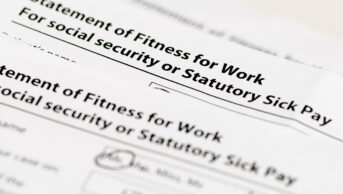
Shutterstock.com
Almost a quarter of primary care networks (PCNs) had either not hired or not claimed NHS funding for hiring a pharmacist — which was made available as part of a new GP contract — by the end of March 2020, responses to Freedom of Information requests by The Pharmaceutical Journal have revealed.
The responses from 124 clinical commissioning groups (CCGs), covering 1,190 PCNs, showed that 67 CCGs had no record of an additional pharmacist being hired under the Additional Roles Reimbursement Scheme (ARRS) in 295 of their PCNs, as of 31 March 2020.
In their responses, ten CCGs specified that the data was dependent on whether the PCN had submitted a claim for funding to cover the costs of hiring a clinical pharmacist through the ARRS.
The ARRS, which was first announced in the GP contract in January 2019, enabled every PCN to claim £37,810 to cover the costs of hiring one additional clinical pharmacist, as part of wider plans to fund “expanded community multidisciplinary teams” in each network. The contract was updated in February 2020 with the announcement that PCNs would be able to claim £55,670 per pharmacist “from April 2020”.
NHS England, which set a target in the GP contract for PCNs to hire six clinical pharmacists by 2023/2024, said the absence of a funding claim should not be taken as a clear indicator that recruitment has not taken place, as many PCNs have taken some time to submit their claims.
However, speaking to The Pharmaceutical Journal, GP leaders acknowledged that some PCNs have “struggled with local challenges in recruitment” for pharmacists.
With 1,251 PCNs currently active, according to the latest NHS Digital data published on 30 June 2020, the responses from CCGs suggest at least 24% of PCNs could be without an additional pharmacist.
CCGs covering 296 PCNs responded to requests for information saying they did not hold the data, while CCGs covering 61 PCNs did not respond. The data also revealed that 599 PCNs did hire and claim funding for a pharmacist as of 31 March 2020.
The figures follow comments made by Nikki Kanani, primary care medical director at NHS England and Improvement, in February 2020, who said some PCNs had experienced difficulty in recruiting experienced pharmacists in some areas of the country.
Graham Stretch, pharmacist and clinical director of Brentworth PCN, told The Pharmaceutical Journal that the proportion of PCNs that did not include a pharmacist under the ARRS scheme is “about right, judging by the comments I read and the discussions I have with other clinical directors”.
He added that recruitment into these positions is likely impacted by “the lack of appropriately qualified pharmacists to fulfil the posts, rather than PCNs deciding they’re going to look elsewhere at different professions”.
“Either they’re struggling to find qualified pharmacists for the money available — because the ‘super-qualified’ pharmacists probably don’t want to work for a band 7 or 8 salary — or there simply aren’t enough, or they’re not quite sure what to do with them,” he said.
However, he added that the PCN directed enhanced service document, which sets out how pharmacists can take on structured medication reviews, “will help sort out that issue of [PCNs] not being sure what they can do”.
In February 2019, the Company Chemists’ Association warned that PCNs may face recruitment issues, saying NHS England’s plan to hire six pharmacists in each PCN “doesn’t marry” with attempts to recruit into the profession.
Krishna Kasaraneni, executive team member of the British Medical Association GP committee, said: “While there may be a number of reasons why some PCNs didn’t recruit pharmacists last year, we do know from our members that some struggled with local challenges in recruitment.”
He added that some PCNs may also “simply have chosen not to [recruit a pharmacist], especially given the fact that PCNs were having to fund 30% of the roles themselves”.
But he said recruitment of pharmacists “could be different” from this year, as the cost of hiring is now fully funded.
In March 2019, NHS England set a pharmacist workforce baseline in general practice, with PCNs only able to claim funding to recruit a pharmacist if the hire was above that baseline.
However, the updated GP contract, published on 6 February 2020, noted that from 1 April 2020, additionality to the workforce baseline would no longer be “operated on a role-by-role basis”, with PCNs able to “substitute between clinical pharmacists, first contact physiotherapists and physician associates within their practice-funded baseline”.
Commenting on the recruitment figures, Claire Anderson, chair of the Royal Pharmaceutical Society’s English Pharmacy Board, said the data “demonstrate the importance of securing a long-term pipeline to recruit pharmacists into these roles”.
“We want pharmacist PCN roles to flourish, so this means the roles must be attractive, making best use of their skills, and that pharmacists get the support they need,” she said.
A spokesperson for NHS England and Improvement said: “As the NHS continues to deal with the pandemic, PCNs — supported by CCGs — have been asked to continue to prioritise the recruitment of additional workforce roles, including clinical pharmacists, backed by £430m funding for new staff.”


